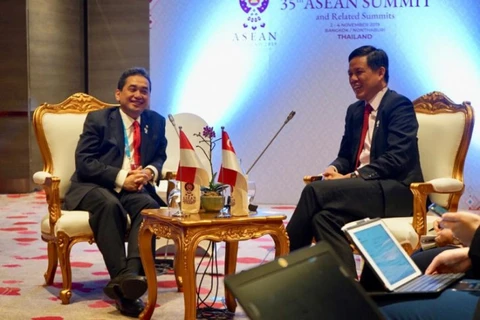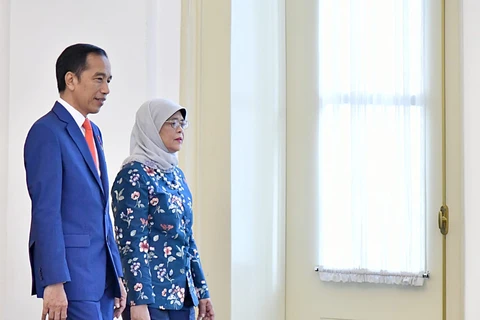 : Indonesia’s Minister for Foreign Affairs Retno Marsudi and Minister for Trade and Industry Chan Chun Sing jointly announce the entry into force of the Singapore-Indonesia Bilateral Investment Treaty at a virtual meeting (Photo: Singaporean Ministry of Industry and Trade)
: Indonesia’s Minister for Foreign Affairs Retno Marsudi and Minister for Trade and Industry Chan Chun Sing jointly announce the entry into force of the Singapore-Indonesia Bilateral Investment Treaty at a virtual meeting (Photo: Singaporean Ministry of Industry and Trade) Jakarta (VNA) – Indonesia and Singapore on March 9 exchanged instruments of ratification to put into force their Bilateral Investment Treaty (BIT), which establishes rules on the treatment of investors and investments from both countries.
Indonesian Foreign Minister Retno Marsudi stated the treaty could potentially boost two-way investment by between 18 percent to 22 percent over the next five years.
The pact would also serve as an important step for the nations to expedite economic recovery after COVID-19, she added.
To Indonesia, the BIT, first signed in October 2018, was the first of its kind to take effect after years of review by the Government.
According to the Indonesian Investment Coordinating Board, Singapore was Indonesia’s largest foreign investor in 2020, with total investment of 9.8 billion USD, which represented a significant increase from the 6.5 billion USD of 2019.
Data from the Singaporean Ministry of Industry and Trade showed that Indonesia remained one of Singapore’s top ten trading partners last year, with bilateral trade reaching 48.8 billion SGD (32.2 billion USD)./.
VNA























